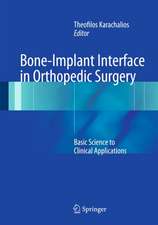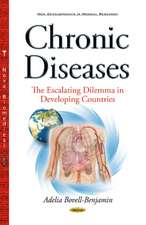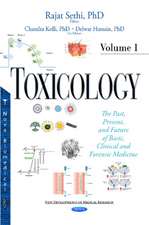Antibacterial Therapy: Achievements, Problems and Future Perspectives
Editat de W. -D. Busse, H. -J. Zeiler, H. Labischinskien Limba Engleză Paperback – 30 sep 1997
Preț: 704.75 lei
Preț vechi: 741.85 lei
-5% Nou
Puncte Express: 1057
Preț estimativ în valută:
134.87€ • 139.33$ • 112.25£
134.87€ • 139.33$ • 112.25£
Carte tipărită la comandă
Livrare economică 26 martie-09 aprilie
Preluare comenzi: 021 569.72.76
Specificații
ISBN-13: 9783540628965
ISBN-10: 3540628967
Pagini: 96
Ilustrații: XIV, 78 p. 6 illus.
Dimensiuni: 155 x 235 x 5 mm
Greutate: 0.15 kg
Editura: Springer Berlin, Heidelberg
Colecția Springer
Locul publicării:Berlin, Heidelberg, Germany
ISBN-10: 3540628967
Pagini: 96
Ilustrații: XIV, 78 p. 6 illus.
Dimensiuni: 155 x 235 x 5 mm
Greutate: 0.15 kg
Editura: Springer Berlin, Heidelberg
Colecția Springer
Locul publicării:Berlin, Heidelberg, Germany
Public țintă
ResearchDescriere
At a symposium in Wuppertal held on 26 September 1995, Dr. Karl-Georg Metzger was honored, on the occasion of his retirement, for his scientific contributions and involvement in antibacterial drug research and develop ment within Bayer AG. In 1963 Dr. Metzger was the first "molecular micro biologist" to join Bayer in the field of antibacterial research. Karl-Georg Metzger studied physics and biology at the University of Mainz from 1950 to 1953 and continued his scientific education, with a grant from the Deutsche Forschungsgemeinschaft, in Frankfurt on Main (1953-1956). From 1956 to 1958, under Professor Kaplan, he worked on his DNA following treatment of PhD, studying on "Energy conduction along bacteria with UV light and X-rays and the formation of mutations". He was awarded his PhD in 1959. From 1958 to 1963 he was research assistant in ra diobiology development at the Institute of Genetics in Cologne. During the following years he became fascinated by the emerging fields of molecular biology and gene technology. He worked together with the molecular gen eticists W. Harms and M. Delbriick, who built up one of the most renowned institutes in the world, in Cologne. ''An incredibly interesting time:' Dr. Metzger remembers, in which he got to know a whole series of Nobel prize winners from Niels Bohr to Watson and Crick and Joshua Lederberg, the first to recombine genotypes of bacteria.
Cuprins
Staphylococci, Nosocomial Infections, and the Magic Ring.- ?-Lactams and Other Innovative New Approaches for Controlling Bacterial Populations.- Expanding and Preserving the Utility of Quinolone Antimicrobials.- Pharmacodynamics of Antibiotics.- Pharmacoeconomic Research with Antibacterials.- New Antibacterial Targets and New Approaches for Drug Discovery.- Pharmaceutical Industry at the Crossroads: Perspectives for Antibacterial Research.
Textul de pe ultima copertă
This volume reviews important contributions in the area of antibacterial research with regard to current status and future therapy problems, especially in the field of beta-lactams, antibiotics, quinolones and other classes of antimicrobials. Possible future tragets and new strategies are discussed from a scientific as well as pharmacoeconomic point of view to meet the needs of the future.













